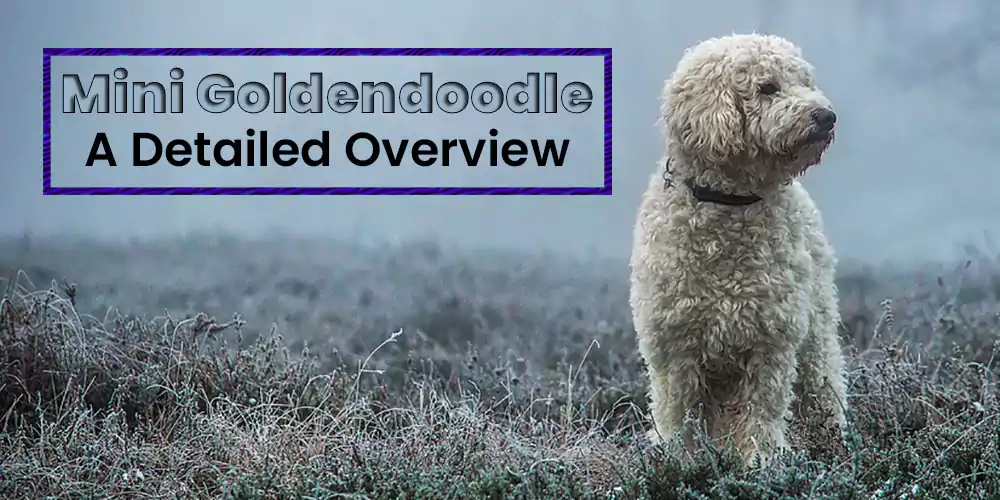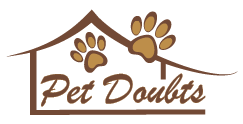Mini Goldendoodle | A Comprehensive Overview

The Mini Goldendoodle is a delightful hybrid breed that combines the friendly nature of a Golden Retriever with the intelligence of a Miniature Poodle. This makes them great companions for families and individuals looking for a loving and playful pet. Their charming personality, combined with their small to medium size, makes them well-suited for various living environments, from apartments to larger homes.

Caring for a Mini Goldendoodle involves regular grooming and exercise, which helps maintain their health and happiness. With proper training and socialization, they can become well-behaved and adaptable dogs. Many potential owners are curious about where to find these puppies and what to consider before making a commitment.
Key Takeaways
- Mini Goldendoodles have a friendly and intelligent temperament.
- Regular care and training are essential for their well-being.
- They are suitable for various living environments and lifestyles.
Breed Overview

The Mini Goldendoodle is a popular hybrid breed known for its friendly nature and appealing size. This section explores its origins, physical traits, and temperament, providing a comprehensive understanding of what makes this breed special.
Origin and History
The Mini Goldendoodle is a crossbreed between the Golden Retriever and the Poodle. This breed began gaining popularity in the early 2000s as breeders sought to create a dog with a friendly temperament and hypoallergenic coat.
The aim was to blend the intelligence and trainability of both parent breeds. Golden Retrievers are known for their loyalty and outgoing nature, while Poodles add intelligence and a low-shedding coat.
These dogs are usually bred from Miniature or Toy Poodles to achieve smaller sizes. The result is a companion dog that fits well in various living situations, from apartments to houses with yards.
Physical Characteristics
Mini Goldendoodles typically weigh between 15 to 35 pounds and stand 10 to 15 inches tall at the shoulder. Their appearance often resembles that of a teddy bear, with soft, wavy fur that can come in various colors such as black, brown, cream, apricot, and red.
Their coat is usually low-shedding, making them a preferred choice for allergy sufferers. Grooming is essential to maintain their coat’s health. Owners should brush their Mini Goldendoodle several times a week to avoid matting and promote a shiny appearance.
This breed’s eyes are often expressive and friendly, adding to its charming personality. Mini Goldendoodles have a sturdy build, which contributes to their overall durability as family pets.
Temperament
The temperament of the Mini Goldendoodle is one of its standout features. They are known for being friendly, intelligent, and eager to please.
These dogs typically exhibit a moderate energy level, making them great companions for families, singles, and seniors alike. They enjoy social interactions and thrive in environments where they can engage with people and other pets.
Training is usually straightforward due to their intelligence. They respond well to positive reinforcement techniques, making them adaptable to various training scenarios. Early socialization is important to ensure they become well-rounded adults.
Mini Goldendoodle Care

Caring for a Mini Goldendoodle involves understanding their dietary needs, exercise requirements, grooming practices, and health considerations. Each area plays a critical role in ensuring the well-being of this friendly and affectionate breed.
Dietary Needs
Mini Goldendoodles require a balanced diet to maintain their health. High-quality dog food that lists meat as the first ingredient is essential. Look for brands that offer complete nutrition suitable for small to medium breeds.
Feeding should generally occur twice a day. Adult Mini Goldendoodles may eat around 1 to 2 cups of food daily, depending on their size and activity level. It’s important to adjust portions based on the dog’s age, weight, and fitness. Always consult a veterinarian for specific dietary options or if special dietary needs arise.
Exercise Requirements
These dogs are active and enjoy playtime. Mini Goldendoodles should have at least 30 to 60 minutes of exercise each day. This can include walks, play sessions, or fetch games to keep them engaged.
It’s helpful to vary activities to prevent boredom. They thrive on mental stimulation as well. Puzzle toys, training sessions, and socialization with other dogs can enhance their physical workout and provide mental challenges.
Grooming Practices
Regular grooming is key for maintaining a Mini Goldendoodle’s fluffy coat. They should be brushed every few days to prevent matting and reduce shedding. Owners may want to consider professional grooming every 4 to 8 weeks.
Various hairstyles can suit their wavy coat, but simple trims can help keep their fur manageable. Bathing should be done as needed, but not too frequently to avoid skin irritation. Owners must check their ears and teeth regularly to maintain overall hygiene.
Health Considerations
Mini Goldendoodles are generally healthy, but like all breeds, they have specific health concerns. Common issues may include hip dysplasia and eye conditions. Regular vet check-ups are important for early detection of any problems.
Vaccinations and preventive care, such as flea and tick medication, are vital. They typically have a lifespan of 12 to 15 years. Owners should be aware of signs of discomfort, changes in behavior, or appetite as these may indicate health issues needing attention.
Training and Socialization

Training and socialization are crucial for Mini Goldendoodles to develop into well-mannered and confident dogs. Proper techniques enable owners to teach their pets essential skills while ensuring positive interactions with people and other animals.
Training Tips
Effective training begins early. Mini Goldendoodles are eager learners, so using positive reinforcement is vital. This means rewarding desired behaviors with treats, praise, or play.
Key commands to teach:
- Sit: Helps with impulse control.
- Stay: Encourages patience.
- Come: Ensures safety in open spaces.
Consistency is essential. Daily training sessions, lasting around 5-10 minutes, keep the dog engaged. Use clear commands and a calm tone. It’s important to avoid harsh corrections, as these can lead to fear or anxiety.
Additionally, enrolling in training classes can provide structure. Attending such classes helps strengthen the bond between the owner and the dog while providing expert guidance.
Socialization Strategies
Socialization should begin in puppyhood. Introducing a Mini Goldendoodle to various people, pets, and environments is essential for building confidence.
Effective socialization techniques include:
- Puppy Playdates: Arrange meet-ups with other vaccinated puppies.
- Public Outings: Take the dog to parks, pet-friendly stores, and busy streets.
- Positive Experiences: Always create a calm atmosphere during introductions.
Gradually expose the dog to different sights, sounds, and experiences. This exposure helps to prevent fear-based behaviors later in life. Remember to monitor the dog’s body language and make adjustments as needed for comfort.
Breeding and Genetics

Breeding Mini Goldendoodles involves careful consideration of practices and genetic health. Responsible breeding ensures healthy puppies and enhances the desirable traits of the breed. Understanding these aspects is crucial for potential breeders.
Breeding Practices
When breeding Mini Goldendoodles, it is essential to choose healthy parent dogs. Responsible breeders perform health screenings for genetic issues common in both Poodles and Golden Retrievers. These tests should include checks for hip and elbow dysplasia, eye conditions, and patellar luxation, especially in smaller varieties.
Breeding plans should prioritize temperament alongside genetics. Mini Goldendoodles should be friendly, intelligent, and sociable. Breeders often choose first-generation (F1) or first-generation backcross (F1B) parents to maintain desirable traits. This careful selection can lead to puppies that are both easy to train and enjoyable companions.
Genetic Health
Genetic health is a significant concern in Mini Goldendoodle breeding. Breeders should be aware of the common health issues that can arise from their parent breeds. For instance, Goldendoodles may inherit anxiety, certain skin conditions, or hip dysplasia.
To minimize risks, potential breeders should use a diverse genetic pool. This approach reduces the chances of genetic disorders and helps produce a healthy litter. Routine health checks after breeding can reveal any emerging issues, allowing breeders to make informed decisions for future pairings. Taking these steps can greatly enhance puppy health and longevity.
Adoption and Purchasing Advice

When considering a Mini Goldendoodle, prospective owners have two main options: adoption and purchasing from a breeder.
Adoption:
- Adoption fees usually range from $400 to $600.
- Various rescue organizations focus on Mini Goldendoodles and other Doodles.
- Rescues often check backgrounds to ensure a good match.
Purchasing from a Breeder:
- Prices can range from $1,500 to $4,000 depending on lineage and breeder reputation.
- A good breeder will provide health clearances and a nurturing environment.
Choosing a Good Breeder:
- Ask for References: Speak with previous customers.
- Visit the Facility: Ensure cleanliness and a good atmosphere for the puppies.
- Health Guarantees: Look for breeders who offer health guarantees for their dogs.
It is essential for buyers to do research and ask plenty of questions. This helps ensure the choice made aligns with the family’s needs and lifestyle.
When adopting or purchasing, one must consider the dog’s future needs including training, socialization, and health care. This thoughtful approach contributes to a happy and healthy life for the Mini Goldendoodle.
Living Environments

Mini Goldendoodles are versatile dogs that adapt well to various living situations. Their friendly nature and moderate size make them suitable for different types of homes, provided they receive the necessary amount of exercise and attention.
Suitable Home Types
Mini Goldendoodles thrive in various home settings. They are a good match for:
- Apartments: Their size makes them ideal for apartment living, especially when owners are active and provide daily walks.
- Houses: They enjoy larger spaces where they can run and play. A fenced yard is a plus for outdoor activities.
- Active Households: This breed loves to be part of family activities, so homes with children or other pets are excellent environments.
These dogs require social interaction, so it’s important that their living space allows for engagement with their owners.
Space Requirements
Space is essential for a Mini Goldendoodle’s well-being. Owners should keep in mind:
- Indoor Space: The dog needs enough room to move comfortably inside. A small apartment can work if there are regular walks and playtime.
- Outdoor Space: A yard is beneficial, allowing the dog to run and explore. Even a small area can suffice if used regularly for playtime.
- Exercise Needs: Daily exercise is crucial. Mini Goldendoodles need at least 30 minutes of physical activity each day, like walks or play sessions.
These requirements ensure that the Mini Goldendoodle stays happy and healthy, whatever their living situation.
Community and Support

Building a supportive community can make a significant difference in the experience of owning a Mini Goldendoodle. Many owners find value in connecting with others who share their passion for this breed. There are various groups and online resources that provide essential support and information.
Owner Groups
Owner groups offer a space for Mini Goldendoodle enthusiasts to connect, share experiences, and seek advice. These groups can be found on social media platforms and local community boards.
Members often share tips on training, grooming, and health care. They may also arrange playdates or local meet-ups to foster connections between dogs and owners.
A few popular online groups include the Golden Doodle Rescue Shelter on Facebook, where members can share stories and photos. These interactions help new owners feel more confident in caring for their pets.
Online Resources
Numerous online resources provide valuable information and support for Mini Goldendoodle owners. Websites like Petdoubt.us offer comprehensive guides on size, characteristics, and health.
Forums such as Pet doubt create an interactive space for advice. Owners can ask questions, share tips, and discuss common challenges.
Additionally, many shelters offer training classes and support groups. These resources help ensure that owners have the tools needed for a successful adoption experience.

Frequently Asked Questions
Many potential owners have specific questions about Mini Goldendoodles. These queries often revolve around their cost, size, living conditions, and common challenges. Each concern is important to consider before bringing a Mini Goldendoodle into a home.
